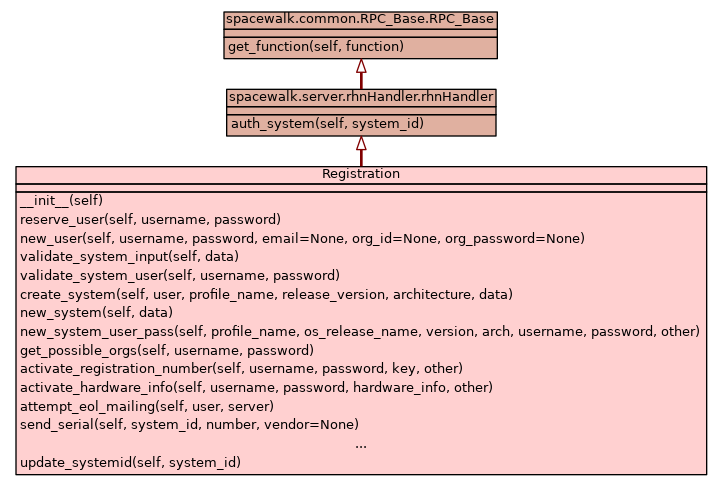|
|
|
|
|
reserve_user(self,
username,
password)
Get an username and a password and create a record for this user. |
source code
|
|
|
|
new_user(self,
username,
password,
email=None,
org_id=None,
org_password=None)
Finish off creating the user. |
source code
|
|
|
|
validate_system_input(self,
data)
check the input data |
source code
|
|
|
|
| validate_system_user(self,
username,
password) |
source code
|
|
|
|
create_system(self,
user,
profile_name,
release_version,
architecture,
data)
Create a system based on the input parameters. |
source code
|
|
|
|
new_system(self,
data)
This function expects at the INPUT a dictionary that has at least the
following members: username, password, os_release, email If the
username does not exist, it is created. |
source code
|
|
|
|
new_system_user_pass(self,
profile_name,
os_release_name,
version,
arch,
username,
password,
other)
Registers a new system to an org specified by a username, password, and
optionally an org id. |
source code
|
|
|
|
|
|
|
|
|
|
__findAssetTag(self,
vendor,
hardware_info)
Given some hardware information, we try to find the asset tag or
serial number. |
source code
|
|
|
|
|
|
|
|
|
|
|
|
|
send_serial(self,
system_id,
number,
vendor=None)
Receive a vendor serial number from the client and tag it to the
server. |
source code
|
|
|
|
upgrade_version(self,
system_id,
newver)
Upgrade a certificate's version to a different release. |
source code
|
|
|
|
add_packages(self,
system_id,
packages)
Add one or more package to the server profile. |
source code
|
|
|
|
delete_packages(self,
system_id,
packages)
Delete one or more packages from the server profile |
source code
|
|
|
|
|
|
|
virt_notify(self,
system_id,
actions)
This function fields virtualization-related notifications from the
client and delegates them out to the appropriate downstream handlers. |
source code
|
|
|
|
update_packages(self,
system_id,
packages)
This function will update the package list associated with a server
to be exactly the list of packages passed on the argument list |
source code
|
|
|
|
_normalize_packages(self,
system_id,
packages,
allow_none=0)
the function checks if list of packages is well formated and also
converts packages from old list of lists (extended_profile >= 2)
to new list of dicts (extended_profile = 2) |
source code
|
|
|
|
__add_hw_profile_no_auth(self,
server,
hwlist)
Insert a new profile for the server, but do not authenticate |
source code
|
|
|
|
add_hw_profile(self,
system_id,
hwlist)
Insert a new profile for the server |
source code
|
|
|
|
refresh_hw_profile(self,
system_id,
hwlist)
Recreate the server HW profile |
source code
|
|
|
|
welcome_message(self,
lang=None)
returns string of welcome message |
source code
|
|
|
|
privacy_statement(self,
lang=None)
returns string of privacy statement |
source code
|
|
|
|
|
|
|
update_contact_info(self,
username,
password,
info={})
this API call is no longer used |
source code
|
|
|
|
update_transactions(self,
system_id,
timestamp,
transactions_hash)
Updates the RPM transactions |
source code
|
|
|
|
anonymous(self,
release=None,
arch=None)
To reduce the number of tracebacks |
source code
|
|
|
|
finish_message(self,
system_id)
Presents the client with a message to display
Returns:
(returnCode, titleText, messageText)
titleText is the window's title, messageText is the message displayed in
that window by the client |
source code
|
|
|
|
|
|
|
|
|
|
register_osad_jid(self,
system_id,
args={}) |
source code
|
|
|
|
available_eus_channels(self,
username,
password,
arch,
version,
release,
other=None)
Given a server arch, redhat-release version, and redhat-release release
returns the eligible channels for that system based on the entitlements
in the org specified by username/password |
source code
|
|
|
|
remaining_subscriptions(self,
username,
password,
arch,
release)
This is an obsoleted API call used in old RHEL5 clients to determine
if they should show the "activate a subscription" page. |
source code
|
|
|
|
update_systemid(self,
system_id)
update_systemid: update client server and certificate In case the
calling system is not using a certificate with a SHA-256 checksum,
update its secret and issue it a new client certificate. |
source code
|
|
|
Inherited from spacewalk.server.rhnHandler.rhnHandler:
auth_system
Inherited from spacewalk.common.RPC_Base.RPC_Base:
get_function
|

